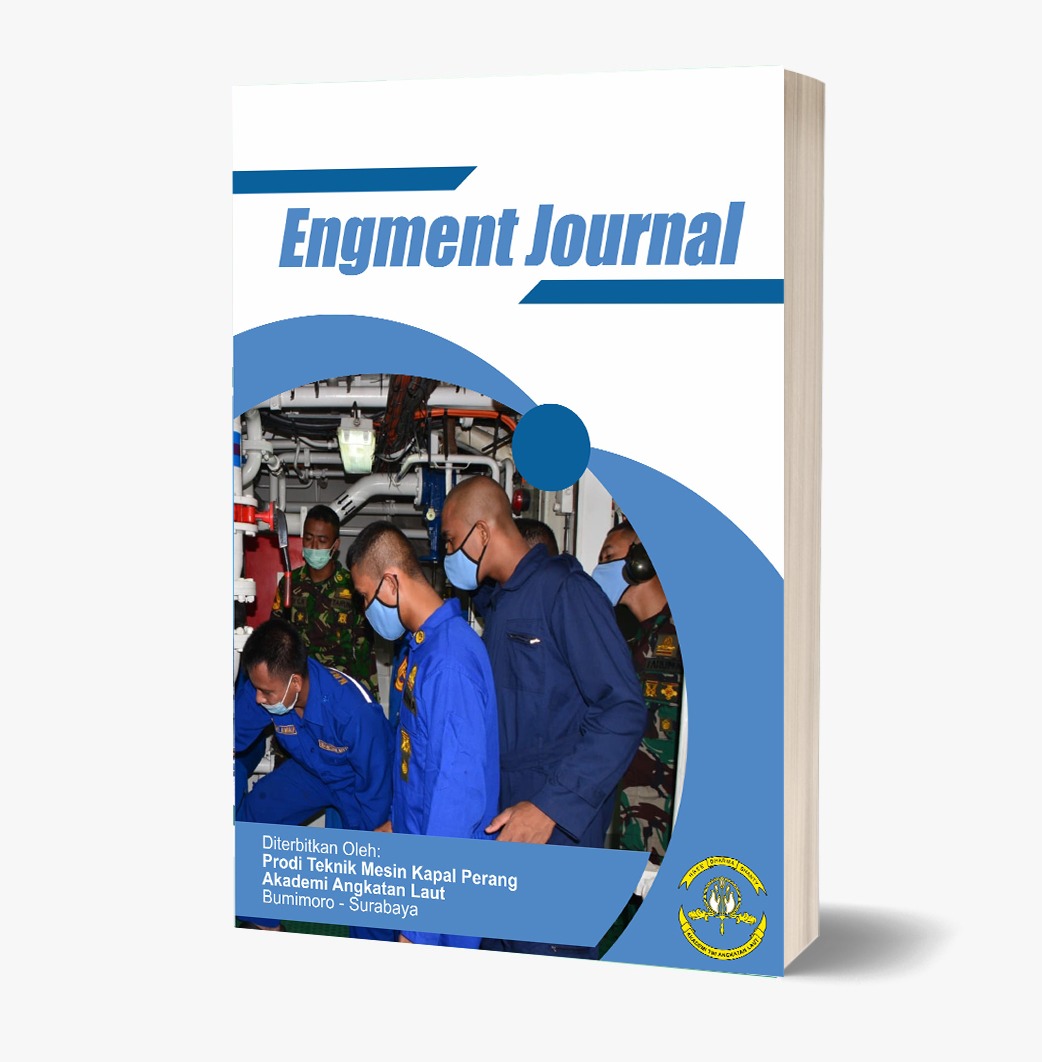ANALISA MANFAAT BELAJAR SISTEM HIDROLIK BAGI TARUNA KORP TEKNIK DI AKADEMI TNI ANGKATAN LAUT (AAL)
DOI:
https://doi.org/10.59447/engment.v1i2.120Keywords:
Hydraulic systems, Military education, Engineering Corps cadetsAbstract
Hydraulic systems are vital components in modern naval vessel operations, controlling 60-70% of all ship operational systems. This research aims to comprehensively analyze the benefits of hydraulic system learning for Engineering Corps cadets at the Indonesian Naval Academy (AAL). The study employed a mixed methods approach with concurrent embedded design, involving 163 cadets for quantitative components and 20 cadets for qualitative components. Data collection techniques included structured questionnaires, pre-test and post-test cognitive tests, practical performance observations, and semi-structured interviews. Quantitative data analysis used descriptive and inferential statistics, while qualitative data was analyzed using thematic analysis. Results showed significant improvement in hydraulic system knowledge with large effect size (Cohen's d = 2.31) and average score increase of 28.8%. Cadets' perception of learning benefits was highly positive (M = 4.31 on a 5-point scale), with "Relevance to Operational Tasks" dimension achieving the highest score (M = 4.47). Practical performance showed 74.8% of cadets achieved good to excellent grades. Qualitative analysis identified five main themes: technical understanding transformation, practical competency development, theory-practice integration, soft skills development, and career motivation and orientation. Factors influencing learning benefits included instructor quality (β = 0.34), practical facility availability (β = 0.28), and learning motivation (β = 0.23). This research confirms that hydraulic system learning provides multidimensional benefits encompassing cognitive, psychomotor, and affective aspects, contributing to holistic professional competency development essential for success as Indonesian Navy technical officers.
References
Anderson, R., & Lee, S. (2021). Evaluation methods in military technical education: A systematic review. Journal of Military Education Research, 15(3), 45-62.
Anderson, L. W., & Krathwohl, D. R. (2020). A taxonomy for learning, teaching, and assessing: A revision of Bloom's taxonomy of educational objectives. Pearson Education.
Brown, M., Thompson, K., & Garcia, J. (2021). Integration of theoretical and practical learning in military engineering education. Defense Education Quarterly, 28(2), 112-128.
Braun, V., & Clarke, V. (2019). Reflecting on reflexive thematic analysis. Qualitative Research in Sport, Exercise and Health, 11(4), 589-597.
Bryman, A. (2021). Social research methods (6th ed.). Oxford University Press.
Creswell, J. W., & Plano Clark, V. L. (2018). Designing and conducting mixed methods research (3rd ed.). Sage Publications.
Davis, P., & Wilson, C. (2022). Hydraulic systems competency and operational performance in naval operations. Naval Engineering Journal, 134(4), 78-95.
Fetters, M. D., Curry, L. A., & Creswell, J. W. (2020). Achieving integration in mixed methods designs: Principles and practices. Health Services Research, 48(6), 2134-2156.
Field, A. (2021). Discovering statistics using IBM SPSS statistics (5th ed.). Sage Publications.
Fraenkel, J. R., Wallen, N. E., & Hyun, H. H. (2022). How to design and evaluate research in education (10th ed.). McGraw-Hill Education.
Glaser, B. G., & Strauss, A. L. (2021). The discovery of grounded theory: Strategies for qualitative research (3rd ed.). Aldine Transaction.
Hair, J. F., Black, W. C., Babin, B. J., & Anderson, R. E. (2019). Multivariate data analysis (8th ed.). Cengage Learning.
Johnson, R. B., Onwuegbuzie, A. J., & Turner, L. A. (2019). Toward a definition of mixed methods research. Journal of Mixed Methods Research, 1(2), 112-133.
Krejcie, R. V., & Morgan, D. W. (1970). Determining sample size for research activities. Educational and Psychological Measurement, 30(3), 607-610.
Lincoln, Y. S., & Guba, E. G. (2022). Naturalistic inquiry (2nd ed.). Sage Publications.
Maritime Education Research Institute. (2023). Longitudinal study on technical officer adaptability in modern naval operations. International Maritime Education Review, 12(1), 23-41.
Moustakas, C. (2019). Phenomenological research methods (2nd ed.). Sage Publications.
Sekaran, U., & Bougie, R. (2020). Research methods for business: A skill-building approach (8th ed.). John Wiley & Sons.
Shadish, W. R., Cook, T. D., & Campbell, D. T. (2021). Experimental and quasi-experimental designs for generalized causal inference (2nd ed.). Houghton Mifflin.
Smith, A., & Johnson, B. (2020). Modern naval vessel hydraulic systems: Design, operation, and maintenance. Naval Technology Press.
Tashakkori, A., & Teddlie, C. (2020). Sage handbook of mixed methods in social and behavioral research (3rd ed.). Sage Publications.
Van Manen, M. (2018). Researching lived experience: Human science for an action sensitive pedagogy (3rd ed.). State University of New York Press.










